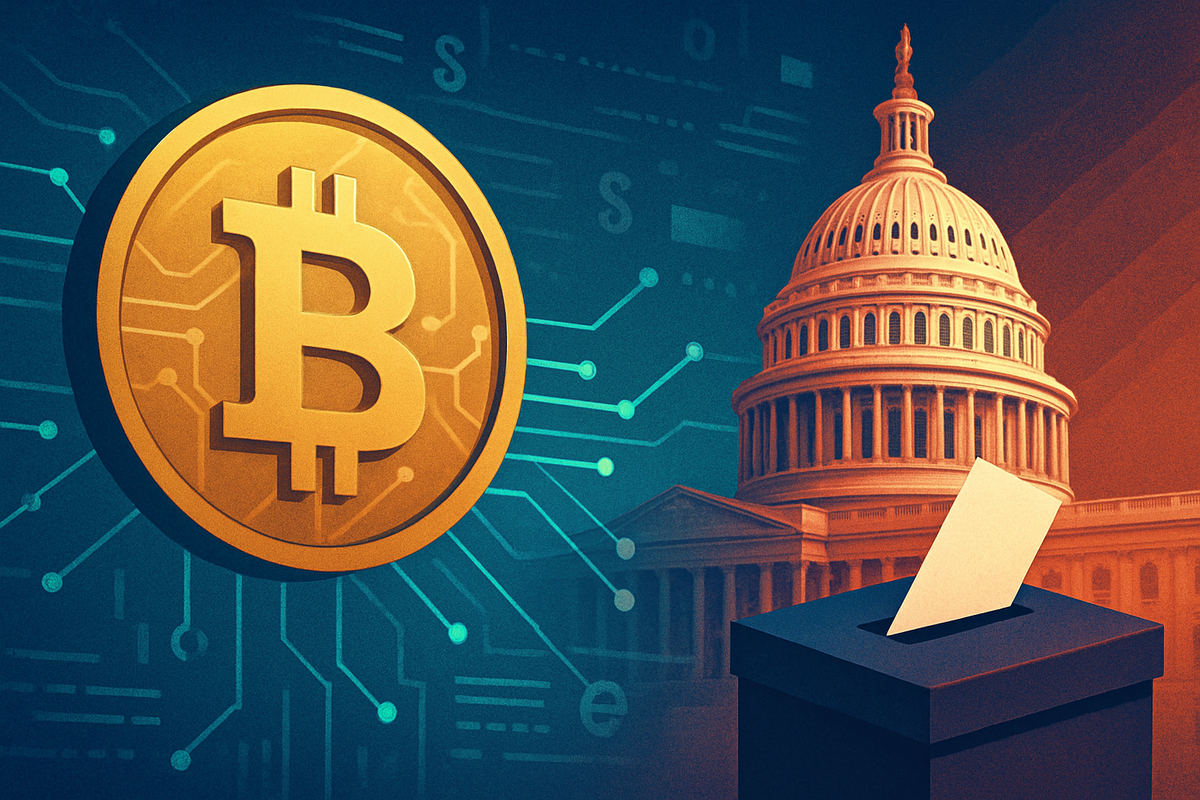
San Francisco, CA – In a bold move that underscores the cryptocurrency industry's escalating efforts to shape its regulatory future, leading crypto exchange Kraken has pledged a substantial $2 million donation to pro-crypto political action committees (PACs) in 2025. This significant financial commitment is being framed by industry leaders as a critical offensive in an ongoing "fight for crypto," aimed at defending core principles of digital asset innovation against what they perceive as overreaching regulation. The donation is set to have immediate and profound implications for the financial markets, intensifying the political lobbying landscape and potentially dictating the trajectory of future crypto legislation.
The strategic injection of funds into politically aligned groups highlights a pivotal moment where the digital asset sector is transitioning from reactive defense to proactive engagement in Washington. With regulatory debates reaching a fever pitch and crucial market structure bills advancing through Congress, Kraken's move signals a concerted effort by major players to back candidates and initiatives that champion a more favorable regulatory environment. This aggressive stance is expected to further polarize the discussion around digital assets but also amplify the industry's voice in an election cycle where crypto policy is increasingly becoming a significant talking point.
Kraken's Political Gambit: A Deep Dive into the $2 Million Pledge
Kraken's Co-CEO, Arjun Sethi, announced on Tuesday, September 23, 2025, that the exchange would allocate $2 million equally between two pro-Trump aligned PACs: $1 million to the Digital Freedom Fund PAC and another $1 million to America First Digital. This latest contribution solidifies Kraken's growing political footprint, building on previous engagements such as a $750,000 donation from its parent company, Payward Inc., to the Fairshake PAC in January 2024. Furthermore, Kraken founder Jesse Powell personally contributed $1 million, primarily in Ether, to former U.S. President Donald Trump's campaign in July 2024, citing concerns over the Biden administration's "unchecked regulation by enforcement."
The Digital Freedom Fund PAC has emerged as a significant recipient of crypto industry largesse, notably receiving a colossal $21 million Bitcoin donation from Gemini (GEMINI) co-founders Cameron and Tyler Winklevoss in July 2025. America First Digital, staffed by former Republican operatives, actively promotes Trump's crypto agenda, advocating for legislation like the BITCOIN Act, which proposes establishing a government-backed strategic Bitcoin reserve. Kraken’s donations are presented as strategic investments in legal and regulatory frameworks, not as backing a specific party, but rather supporting the principles of privacy, self-determination, and the right to self-custody assets in the digital age. This narrative positions the "fight for crypto" as a defense of fundamental constitutional rights, embedded in code.
Sethi emphasized that these foundational rights are under threat from "regulatory uncertainty," potential bans on privacy tools, and efforts to criminalize core blockchain infrastructure, citing federal scrutiny and charges against developers of protocols like Bitcoin mixer Samourai Wallet and Ethereum-based Tornado Cash. The industry's strategic alignment with Republican causes, particularly pro-Trump PACs, marks a distinct shift from general lobbying to more direct ideological advocacy, aiming to leverage anti-establishment sentiment to push for decentralized systems and privacy rights. This partisan approach, while potentially polarizing, aims to strengthen the industry's political influence as regulatory battles intensify ahead of the 2026 midterm elections.
Market Movers: Winners and Losers in the Crypto Lobbying Boom
Kraken's (KRAKEN) substantial political donation signals a broader trend where cryptocurrency firms are increasingly using political donations as a crucial tactic to influence U.S. policy, creating potential winners and losers across the financial landscape. Kraken itself stands to gain significant influence in shaping future regulations, potentially securing a more favorable operational environment for its exchange. By aligning with specific political factions, the exchange aims to foster policies that support its business model and the broader crypto ecosystem it operates within. This proactive engagement could lead to greater regulatory clarity, which is often cited as a key factor for institutional adoption and sustained growth in the digital asset market.
Other major crypto players, such as Coinbase (NASDAQ: COIN), Ripple Labs (XRP), Andreessen Horowitz, and Gemini (GEMINI), who have also made substantial political investments, are similarly positioned to benefit. A more defined and supportive regulatory framework could reduce legal uncertainties, lower compliance costs, and open new avenues for product development and market expansion. These firms are collectively pushing for the U.S. to maintain its competitiveness in the global crypto landscape, arguing that clear regulations are essential for cryptocurrency to evolve into a "foundational layer of the global financial system." Success in these lobbying efforts could unlock significant growth opportunities, attracting more capital and talent into the space.
Conversely, traditional financial institutions and established regulatory bodies like the Securities and Exchange Commission (SEC) and the Commodity Futures Trading Commission (CFTC) could find themselves in a more challenging position. The increased lobbying by crypto firms aims to push back against what they perceive as overreach or an outdated regulatory approach, potentially leading to a re-evaluation of their authority and jurisdiction over digital assets. While the industry seeks clear rules, some critics, particularly from the Democratic side, worry about potential regulatory gaps and the misuse of crypto by traditional financial institutions if most crypto assets are exempted from SEC oversight. This intensified political battle could lead to further friction and a prolonged period of regulatory uncertainty for those not aligned with the pro-crypto agenda.
Wider Significance: Reshaping the Regulatory Horizon
Kraken's $2 million donation is not an isolated incident but rather a potent symbol of a broader, accelerating trend: the crypto industry's full-scale entry into the political arena. This event fits into a growing pattern of digital asset firms increasing their political lobbying efforts, moving beyond traditional industry associations to directly fund PACs aligned with specific political ideologies. The partisan alignment, primarily with Republican-led initiatives, signifies a strategic shift designed to tap into anti-establishment sentiments and advocate for decentralized systems and privacy rights, reflecting a growing divide in how political parties view crypto regulation.
The ripple effects of this intensified lobbying are likely to be far-reaching. Competitors and partners within the crypto ecosystem, from decentralized finance (DeFi) protocols to blockchain infrastructure providers, will be closely watching the outcomes. A successful push for clear, innovation-friendly regulation in the U.S. could set a global precedent, influencing how other nations approach digital asset governance. Conversely, a highly polarized or fragmented regulatory environment could stifle innovation, drive talent offshore, and create an uneven playing field. The ongoing debate between the SEC and CFTC over jurisdiction further complicates matters, with industry lobbying aiming to clarify which assets fall under which regulatory purview.
Historically, industries facing significant regulatory scrutiny, from big tech to pharmaceuticals, have engaged in extensive lobbying. The crypto industry's current approach draws parallels to these past battles, where substantial financial contributions were used to influence policy. However, the unique, decentralized nature of crypto and its philosophical underpinnings of individual sovereignty and financial freedom add a distinct ideological dimension to this fight. Recent legislative advancements, such as the passage of the Guiding and Establishing National Innovation for US Stablecoins (GENIUS) Act in the House in July 2025, and Senator Cynthia Lummis's indication that a broader digital asset market structure bill could reach President Donald Trump's desk by the end of 2025, underscore the critical timing of Kraken's intervention. These legislative efforts, coupled with the industry's lobbying, aim to create a predictable and supportive framework, but concerns about potential regulatory gaps and consumer protection remain paramount.
What Comes Next: Navigating the Future of Crypto Policy
The immediate aftermath of Kraken's (KRAKEN) significant donation will likely see a surge in political discourse surrounding cryptocurrency, particularly as the 2026 midterm elections draw closer. In the short term, expect increased scrutiny on pro-crypto PACs and their funding sources, as well as intensified debate on proposed legislation such as the BITCOIN Act and broader market structure bills. The industry's direct engagement with politically aligned groups could accelerate the legislative process, potentially leading to clearer guidelines for digital assets sooner rather than later. However, it could also harden opposition from those wary of the industry's influence, leading to more contentious legislative battles.
In the long term, the success or failure of these lobbying efforts will profoundly impact the operational environment for crypto businesses in the U.S. If the industry can secure a favorable regulatory framework, it could unlock massive market opportunities, fostering innovation, attracting institutional investment, and cementing the U.S. as a leader in the global crypto economy. This could lead to the mainstream adoption of digital assets and blockchain technology across various sectors. Conversely, if lobbying efforts are met with significant resistance or result in overly restrictive regulations, it could lead to strategic pivots, with some firms potentially shifting operations to more crypto-friendly jurisdictions, thereby limiting growth and innovation within the U.S.
Potential strategic adaptations required from crypto firms include greater transparency in their lobbying activities, a more unified industry front to avoid fragmentation, and a continued focus on educating policymakers about the benefits and nuances of digital assets. Market opportunities may emerge in areas with regulatory clarity, such as stablecoins or tokenized real-world assets. Challenges will undoubtedly include navigating a complex and potentially hostile political landscape, addressing concerns about illicit finance, and ensuring consumer protection while preserving the core tenets of decentralization. Potential scenarios range from a "crypto-friendly" legislative triumph, leading to a boom in the U.S. market, to a protracted regulatory stalemate that hinders innovation and growth.
Wrapping Up: The Enduring Impact of Crypto's Political Awakening
Kraken's (KRAKEN) $2 million donation to pro-crypto PACs marks a definitive turning point in the cryptocurrency industry's relationship with U.S. politics. The key takeaway is clear: crypto is no longer content to merely exist; it is actively fighting for its future, leveraging significant financial resources to shape policy and defend its core principles. This strategic pivot towards direct political engagement reflects a maturing industry keenly aware that its long-term viability hinges on a supportive regulatory framework, not just technological innovation.
Moving forward, the market will be defined by the outcome of this intensified lobbying battle. A successful push for clear, effective, and innovation-friendly regulations could usher in an era of unprecedented growth and mainstream adoption for digital assets, transforming the financial landscape. Conversely, a fragmented or overly restrictive regulatory environment could stunt the industry's potential, driving innovation and investment elsewhere. The current date of September 24, 2025, places this event firmly in the present, with its implications set to unfold in the coming months and years.
Investors should closely watch several key indicators in the coming months: the progress of digital asset market structure bills in Congress, the rhetoric from key political figures regarding crypto, and any further significant political donations from major industry players like Coinbase (NASDAQ: COIN) or Ripple Labs (XRP). The outcome of the 2026 midterm elections will also be crucial, as the political alignment of future lawmakers could significantly impact the regulatory trajectory. Kraken's bold move is a powerful reminder that the future of finance is increasingly intertwined with the machinations of political power, and the "fight for crypto" is far from over.
This content is intended for informational purposes only and is not financial advice







